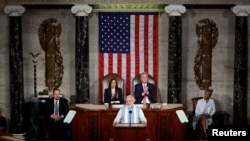Indian Prime Minister Narendra Modi told U.S. lawmakers Thursday the United States-India partnership is bound by the shared values of respecting debate and equality in a democracy.
“The U.S. is the oldest and India the largest democracy,” Modi said, addressing a joint meeting of the U.S. Congress. “Our partnership augurs well for the future of democracy.”
U.S. lawmakers hailed Modi’s address as a key opportunity to forge closer ties between the United States and India, even as concerns remain about Modi’s human rights record.
“Our partnership — which spans trade, innovation, technology and security — has never been closer, stronger or more important. From this solid foundation, anything is possible. I look forward to increased economic and national security ties between our two great nations,” House Speaker Kevin McCarthy said in a statement following the address.
Modi told U.S. lawmakers that India’s rapidly growing economy was driven by women-led development and the technological innovations of the younger generation. He also said bloodshed and suffering in Ukraine must be put to an end and emphasized the importance of “a free, open and inclusive Indo-Pacific, connected by secure seas.”
Senate Minority Leader Mitch McConnell said a in statement after meeting with Modi, “India and the United States share more than robust trade and basic values. We share an interest in keeping the Indo-Pacific free and open, and we face common challenges. India understands China’s belligerent behavior firsthand.”
Pauses in Modi’s speech were greeted by enthusiastic chants of “Modi, Modi, Modi,” from visitors filling the upper galleries of the House of Representatives chamber. The most sustained applause from members of Congress followed Modi’s acknowledgment of Vice President Kamala Harris’ Indian heritage.
Modi is the only Indian prime minister to address a joint meeting of Congress twice. His last speech to Congress was in 2016. He was denied a visa to visit the United States on the basis of human rights concerns in 2005 under the administration of President George W. Bush.
Earlier this week, 70 members of Congress signed on to a letter urging Biden to raise key human rights concerns in his meetings with Modi, citing 2022 U.S. State Department reports on a rise in religious intolerance and a tightening of controls on political expression.
“We want a close and warm relationship between the people of the United States and the people of India. We want that friendship to be built not only on our many shared interests but also on shared values,” said the letter, led by Democratic Senator Chris Van Hollen and Democratic Representative Pramila Jayapal.
“We do not endorse any particular Indian leader or political party — that is the decision of the people of India — but we do stand in support of the important principles that should be a core part of American foreign policy,” the letter read in part.
Before Modi’s speech, Democratic Representative Jim Costa told VOA that while the U.S. and India have strong bilateral relations, human rights remain a source of concern.
“Many of us have been concerned by what we would call backsliding on the part of India as they become more ultranational and in their adherence to democratic principles to talk about freedom of speech, freedom of religion, and the important ability to demonstrate, and to make your views known without being punished,” Costa said.
Democratic Representative Ilhan Omar announced in a tweet on June 20 that she would not attend the speech.
“Prime Minister Modi’s government has repressed religious minorities, emboldened violent Hindu nationalist groups, and targeted journalists/human rights advocates with impunity,” she said.
Omar said she would instead hold a briefing “to discuss Modi’s record of repression and violence.”
Democratic Representative Rashida Tlaib also announced she would not attend the speech. Both women are Muslims.
Democratic Senator Mark Warner and Republican Senator John Cornyn, co-chairs of the Senate India Caucus, introduced legislation earlier this week that if passed would add India to the list of favored nations for U.S. arms sales.
“It’s also more important than ever — in the face of rising global authoritarianism — that we respect and reaffirm the shared values that form the foundations of our respective nations, such as democracy, universal human rights, tolerance and pluralism, and equal opportunity for all citizens,” Warner said in a statement following the speech.
Tabinda Naeem contributed to this report.




